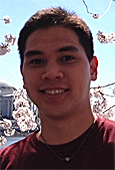 Welina mai kakou ʻo Kauanoe Batangan koʻu inoa. I was born in Honolulu and raised on the island of Maui as the oldest son of Reuben Batangan and Lyla Eldredge. A product of the Kamehameha Schools Maui, I started as one of the original eighty students and finished as a member of KSM’s third graduating class in 2008. My undergraduate studies were done at Stanford University, where I completed a BA in Political Science with a minor in Native American Studies. It was there that I first learned of FNFP and became interested in the study and practice of nation building as it pertains to our indigenous community.
Welina mai kakou ʻo Kauanoe Batangan koʻu inoa. I was born in Honolulu and raised on the island of Maui as the oldest son of Reuben Batangan and Lyla Eldredge. A product of the Kamehameha Schools Maui, I started as one of the original eighty students and finished as a member of KSM’s third graduating class in 2008. My undergraduate studies were done at Stanford University, where I completed a BA in Political Science with a minor in Native American Studies. It was there that I first learned of FNFP and became interested in the study and practice of nation building as it pertains to our indigenous community.
After graduating from college, I moved to Washington, D.C. to work in our nation’s capital. I’ve served on the Senate Committee on Indian Affairs and with Senator Daniel Akaka before moving to my current role in the Office of Representative Tulsi Gabbard. Here, my kuleana is to provide education on policy issues affecting the Native Hawaiian community and to ensure that our indigenous manaʻo is incorporated into the American decision making process.
The opportunity to learn and serve as a fellow in the First Nations’ Futures Program is humbling and exciting, and I look forward to growing along with my peers through this experience.
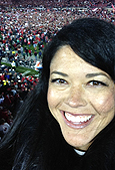 ‘O Le‘ahi Davis Naone Hall ko‘u inoa. No Hamakualoa, Maui mai au.
‘O Le‘ahi Davis Naone Hall ko‘u inoa. No Hamakualoa, Maui mai au.
Growing up, malama ‘aina was more than just a concept. I observed my parents’ deep commitment to the ‘aina and can recall many meetings in the Maui County Council Chambers, sometimes falling asleep in my mother’s arms, while my parents and other community members and friends testified to protect water rights, open beach access, and preserve cultural sites. I remember praying at Honokahua as a young child in 1989 when Hawaiians from every island gathered to honor our ancestors, and I was fortunate to be present at Palauea Beach during the ceremony returning the island of Kaho‘olawe to the State of Hawaii. Malama ‘aina continues to be an important part of my life.
I am a member of the first graduating class of Punana Leo o Maui, and one of two students who continued Hawaiian language immersion education through high school in the lead class of Kula Kaiapuni o Maui. The establishment of Punana Leo and Kula Kaiapuni on Maui would not have been possible without the tireless efforts of many people to provide a culturally-based public education option. Kauikeaouli proclaimed Hawai‘i to be a kingdom of literacy and learning. The dedication of my parents and others is a contemporary example of the importance our ancestors placed on education and ‘ike hohonu. Important goals of Kaiapuni education were to be well-versed in Hawaiian values and protocol as we also prepared to be members of a larger, global community. In short, we were being prepared to be twenty-first century Hawaiians with our own unique perspective, yet able to navigate a complex modern world.
Being raised in a rich cultural environment contributed to my earning a degree in Cultural and Social Anthropology from Stanford University. In addition to academic pursuits, I was a volleyball player from age 9. My playing days culminated in four years as a member of the Stanford women’s volleyball team, during which time Stanford won two NCAA championships. After Stanford, I became a youth volleyball coach. I have coached teams to numerous top 10 National finishes, including a State Championship and a #1 National Ranking.
I have also worked in admissions as an outreach coordinator. This position has enabled me to provide access to private school education for deserving applicants who are underrepresented or economically disadvantaged. I feel that these experiences will help me be an active and eager participant in the First Nations’ Futures Program.
It is a momentous and exciting time for Native Hawaiians with the prospect of nation building before us. More than ever we must unite as a people. A crucial element will be the indigenous management of land and resources, cultivating a symbiotic relationship that respects the past and provides for the future. I am humbled and honored to be part of this program with other engaged fellows. I want to effect change through education, collaboration and service to others, to make wiser decisions about how land is used, and to protect the irreplaceable {re}sources of our culture. Mai ka po i ke ao – as dawn breaks in this new era, we call out e ala e.
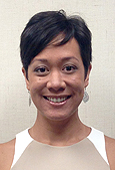 Aloha, my name is Tammy Keli‘i Kapali. I was born and raised on the island of Kaua‘i in the moku of Kawaihau. I attended the Kamehameha Schools as a boarder and graduated in 2002. In 2008, I earned a BBA in Marketing from the University of Hawai‘i Shidler College of Business.
Aloha, my name is Tammy Keli‘i Kapali. I was born and raised on the island of Kaua‘i in the moku of Kawaihau. I attended the Kamehameha Schools as a boarder and graduated in 2002. In 2008, I earned a BBA in Marketing from the University of Hawai‘i Shidler College of Business.
I’ve been working at PBR HAWAII for the past five years as a planner. During that time, I’ve prepared and processed a variety of entitlements including environmental assessments, environmental impact statements, agricultural feasibility studies, and land use permits. More recently, my planning capacity and interests include natural and cultural resource management and community and regional planning.
I currently reside on O‘ahu with my son, Waikā Kapali who attends Ke Kula Kaiapuni ‘o Waiau. We volunteer together at Loko Ea fishpond in Waialua to mālama ‘āina and to do so as a family.
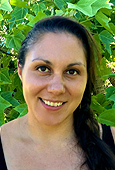 ‘O Māhealaniokapualehua Kauahi au. I was born and raised on Hawai’i Nui Kuauli with my ancestral roots deeply connected to Kalapana, Puna. Currently, I reside in the homestead of Pana’ewa, in the moku of Hilo. Farming is a way of life for my ‘ohana and we continually are learning and experimenting on how we can efficiently work toward creating a sustainable farming community. The greatest lesson learned directly from the ‘āina is the power of careful observation and the need for patience in all circumstances.
‘O Māhealaniokapualehua Kauahi au. I was born and raised on Hawai’i Nui Kuauli with my ancestral roots deeply connected to Kalapana, Puna. Currently, I reside in the homestead of Pana’ewa, in the moku of Hilo. Farming is a way of life for my ‘ohana and we continually are learning and experimenting on how we can efficiently work toward creating a sustainable farming community. The greatest lesson learned directly from the ‘āina is the power of careful observation and the need for patience in all circumstances.
Upon graduation from Waiākea High School, I attended the University of Hawai‘i at Mānoa for one year. In the freshman year of my college experience, I gained clarity on what I am passionate about, my kuleana in my ‘ohana and future goals associated with my personal and professional endeavors. This led to my transfer to the University of Hawai’i at Hilo where I graduated with a B.A in Hawaiian Studies and Anthropology. Shortly after graduation, I accepted a position with Ka ‘Umeke Kā‘eo, a Hawaiian Immersion charter school in Keaukaha, Hilo. In 2012, I graduated with a M.B.A. specializing in Environmental Management with the hopes to navigate my career towards caring for the ‘āina through the incorporation of my education background, Western techniques and theories on environmental management along with cultural values and practices. My current position as a Hawaiian Resource Specialist in the ‘Āina-Based Education Department at Kamehameha Schools allows for that incorporation to occur organically through my work with our ‘āina partners and various community organizations.
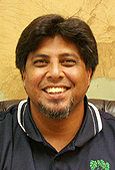 Daniel Ornellas is a native of Maui, born and raised in the district of Wailuku. His Ohana are makaainana and they continue to farm the same kuleana as those granted in the mahele. Ornellas is a practicing Roman Catholic and his family has ties to the original Catholic mission to Maui established in the 1830’s. He graduated from St. Anthony Schools in 1988 and went onto a fruitful educational experience at the University of Hawaii at Manoa, with the critical support of Princess Bernice Pauahi Bishop. Ornellas received his BA in 1992 and then went on to graduate with a Master of Urban and Regional Planning in 2001 specializing in Land Use Planning and Design with a focus on native land use perspectives. Next, Ornellas spent 8 years with the State Department of Hawaiian Home Lands serving as a Land Use Planner and now Ornellas is serving his 10th year as the current Maui District Land Agent for the State Department of Land and Natural Resources. Ornellas is responsible for the prudent management and oversight of over 120,000 acres of government lands spread out amongst four islands within the Maui District. In his spare time, Ornellas is an active member of the St. Ann Parish Council; Board member with the St. Anthony Jr. Sr. High School; Steward and Community Action Committee member with the Hawaii Government Employees Association; and he is an avid history buff interested in early 1800s to 1900s Hawaiian history and land title issues.
Daniel Ornellas is a native of Maui, born and raised in the district of Wailuku. His Ohana are makaainana and they continue to farm the same kuleana as those granted in the mahele. Ornellas is a practicing Roman Catholic and his family has ties to the original Catholic mission to Maui established in the 1830’s. He graduated from St. Anthony Schools in 1988 and went onto a fruitful educational experience at the University of Hawaii at Manoa, with the critical support of Princess Bernice Pauahi Bishop. Ornellas received his BA in 1992 and then went on to graduate with a Master of Urban and Regional Planning in 2001 specializing in Land Use Planning and Design with a focus on native land use perspectives. Next, Ornellas spent 8 years with the State Department of Hawaiian Home Lands serving as a Land Use Planner and now Ornellas is serving his 10th year as the current Maui District Land Agent for the State Department of Land and Natural Resources. Ornellas is responsible for the prudent management and oversight of over 120,000 acres of government lands spread out amongst four islands within the Maui District. In his spare time, Ornellas is an active member of the St. Ann Parish Council; Board member with the St. Anthony Jr. Sr. High School; Steward and Community Action Committee member with the Hawaii Government Employees Association; and he is an avid history buff interested in early 1800s to 1900s Hawaiian history and land title issues.
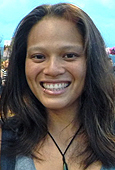 Aloha, my name is Kaui Sana. I was raised in Lualualei Valley, Waiʻanae, Oʻahu.
Aloha, my name is Kaui Sana. I was raised in Lualualei Valley, Waiʻanae, Oʻahu.
I graduated from Waiʻanae High School and attended Leeward Community College through an internship with MAʻO Organic Farms and their Youth Leadership Training Program. I received my Associate Degree in Liberal Arts with a certificate in community food security in 2010. After receiving my A.A., I was humbly asked to be one of the Farm Co-Managers at MAʻO Organic Farms, where I managed and trained younger interns on farm production while learning in depth about farm operations and business.
I then went on to finish my B.A. in Hawaiian Studies at Hawaiʻinuiākea School of Hawaiian Knowledge. When I graduated in Fall 2012 I was promoted to the Farm Manager of MAʻO Organic Farms.
At MAʻO Organic Farms, I manage the daily operations with 40+ young adults where we harvest, wash, pack, and deliver 500-1,000 lbs of fresh produce three times a week. My kuleana is not only to feed people, but to grow the future leaders of Hawaiʻi through the practice of aloha ʻāina. I believe that this is the time of Mana Moana and the ancient knowledge of our kupuna from all over the Pacific will be revealed again. Our indigenous knowledge(s) have not been forgotten, we just have not remembered them yet.
I am humbled and excited to be part of the First Nations’ Futures Program. I look forward to working with my fellows, sharing our collective knowledge and creating opportunities for our community.


